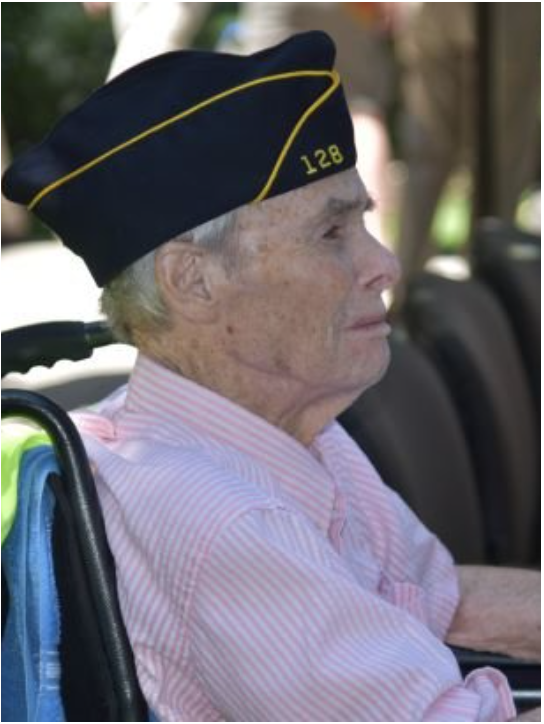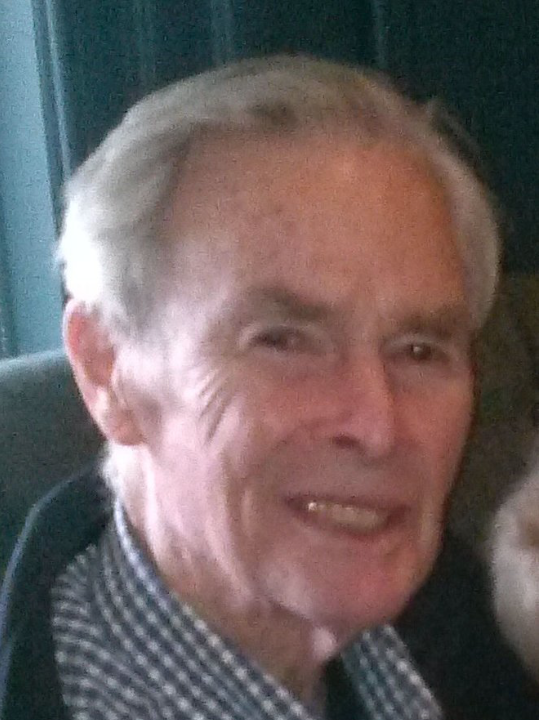Honoring Rye Veteran and former Mayor, John Carey
As our celebration of veterans comes to a close, we would like to honor the memory of our local hero and former Mayor, John Carey. Rye Historical Society and our dedicated eighth graders were fortunate to interview John Carey last Memorial Day and capture his firsthand account of World War II. Our Rye Veteran Stories are recorded as oral histories. We transcribed this one to share John Carey's words with a wider audience. It is with immense respect for John Carey's life of service, as a leader in Rye and beyond, that we bring you his Rye Story. We would like to thank Doug Carey for his help telling this story.
Mari (Interviewer):
My name is Mari and I’m thirteen years old. Today is May 27, Monday, 2019. I am speaking with John Carey in New York, in Rye.
Mari: What do you remember about the day you remember about the day you enlisted? How old were you?
John Carey: I didn’t really enlist. I joined the Navy reserve in college. And I was eighteen years old and was expected to serve, so I signed up and joined the Navy.
My older brother was a soldier in the army. He was fighting in Europe in 1944 trying to drive the Germans out of France and unfortunately he was hit by machine gun pellets. For one whole week, he suffered. One whole week.
Doug Carey: So every year between November 15th and November 23rd we especially think of Henry, and Henry and my dad’s mother, who lost her husband from lung disease from World War I and her oldest son within one year. And she got the telegram – in those days, there was a knock on the door. My dad was in the Pacific when he got a telegram almost two months after his brother had died just saying that he was wounded, and then it was another month before the knock on the door, and then it was two people, and then grandma Peg knew that her son had passed away. Nineteen years ago, we took my dad to France to go to his brother’s grave in the Epinal cemetery in Alsace, just a few miles from the German border, and it was the most important day we ever spent together. We went in the rental car and I walked the footsteps of the 114th infantry and they freed seventeen villages from the Germans in three weeks. To give you an idea about today and how important it is to remember, 27000 allied soldiers were buried on the farm and then mothers and wives were given the option the US government would ship – unbury them and ship them home – to be buried here. Well 14000 came home but my dad’s mom wanted Henry to stay there because he gave his life to France and if you go there today there’s over 13,000 and their death dates are only about 6 weeks apart. And seventeen kilometers down the road there’s another Allied cemetery and there’s about 11000 and their death dates are only about three weeks apart. So this might be a day of going to the beach for some, but for us and so many others it’s a day to remember. We have a cousin on my mom’s side who still hasn’t come home from Southeast Asia, Vietnam war, and we’re hoping that he’ll still come home one of these days, either in spirit or in body. My dad was on a Destroyer Escort a DEE, and a, tell her the name of the DEE and the other ship, Dad.
John Carey: The USS Loy, L-O-Y, DEE 160
Doug: And where were you when you were on the Loy?
John Carey: I was on the ship on this side of the Atlantic, and I was working on sinking submarines, so I went off the coast of the Atlantic, looking for submarines to sink. Finally we and all the men on the European side, we went to the look for subs in the Mediterranean. We did that, also.
Doug: And then you were in the Pacific, too, right?
John Carey: Yes
Doug: And what ship were you on in the Pacific?
John Carey: In the Pacific, I was on a () ship DC 1245. 1-2-4-5
Doug: Anything else you wanted to say?
John Carey: When I was in the Pacific, the war ended, with the surrender of European forces throughout the Pacific.
Mari: I want to ask what has been difficult to communicate to your family and friends about your military service?
John Carey: Well, what’s difficult to communicate is the sense of loss and not being in constant contact with relatives. What is also lost is the opportunity to see your relatives almost every day.
Mari: How did you feel after the war, or how did it change you as a person?
John Carey: After the war, my feeling was Thank God it was over. I think we all worry about ourselves, and I was thankful to have survived.
Doug: Do you think it impacted you when you were US Representative for the Subcommission of Human Rights for the UN?
John Carey: Well I think any experience like being in a war, will help to qualify you for an opportunity to serve and help at the United Nations.
Doug: You always told me that if you were in a war, you were less likely to encourage another war and more likely to seek diplomatic solutions to problematic challenges.
John Carey: That’s exactly right. I would seek to avoid other future wars.
John’s granddaughter: Anything else, Grandpa?
John Carey: There’s a lot of reasons for going to war that are not all covered under the subject of self-defense. Self defense is an excusable reason for making war. You can’t let an enemy simply conquer you, and I accept that.
Mari: Thank you so much for today. I really appreciate it. This has definitely changed my outlook on war and how I’ve been learning about it in Social Studies. I thank you so much.
John Carey: You’re very welcome, I’m very glad to have the chance to talk with someone who’s still in school and exchange opinions with such a person.
Mari: Thank you
By Alison Relyea
Link to John Carey’s obituary from Graham Funeral Home:
https://grahamfuneralhomerye.com/tribute/details/308/John-Carey/obituary.html


